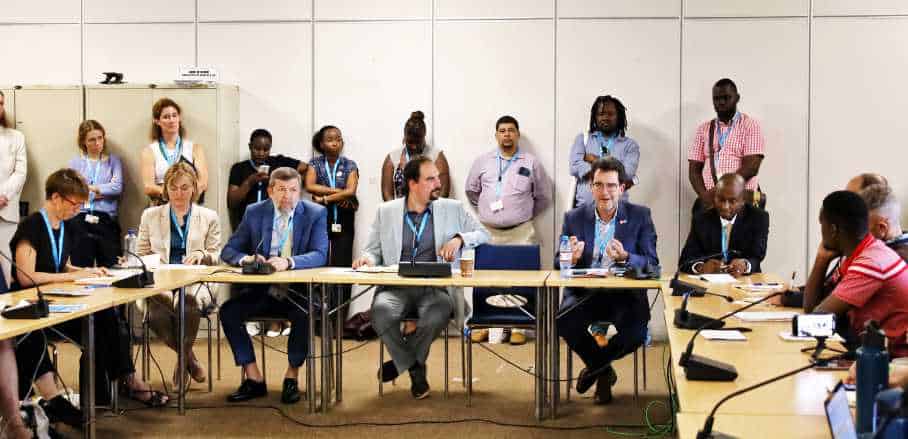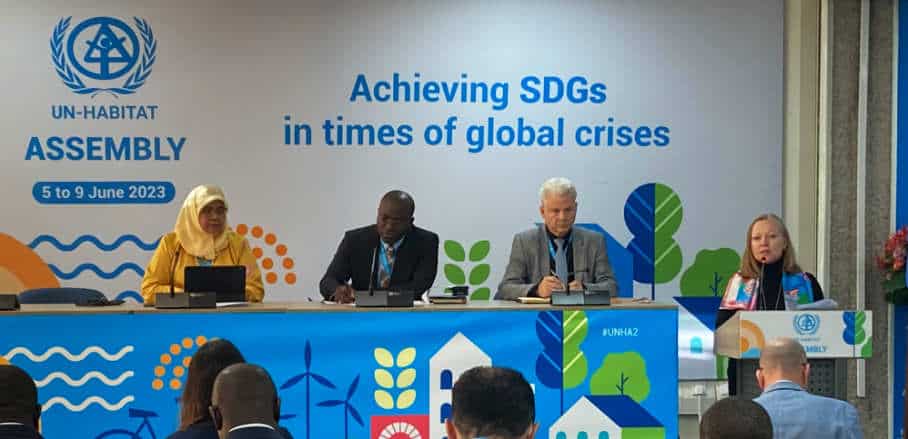United Nations Habitat Assembly: Affordable Housing for All
The second United Nations Habitat Assembly took place in Nairobi from June 5 – 9. Reuben Kyama attended the high-profile event which ended by adopting a historical resolution.
The UN-Habitat Assembly is the highest global decision-making body on sustainable urbanisation and human settlements, which convenes every four years. The first session of the assembly took place four years ago.
This year, the assembly adopted a historical resolution on “Affordable Housing for All.” The member states agreed to renew their call to prioritise adequate housing and view housing as a human right for the first time since 1948 when the Universal Declaration of Human Rights was adopted.
Declaring Housing as a Human Right
“Delegates of the Assembly recognised that the global housing crisis affects all and is present in all regions of the world”, said Maimunah Mohd Sharif, Executive Director of the United Nations Human Settlements Programme (UN-Habitat).
She added: “Almost all countries are struggling to ensure their citizens have access to affordable and adequate housing. Globally, 1.6 billion people continue to live in inadequate shelters. We must act now to create a better urban future for them.”
According to the resolution, an open-ended intergovernmental working group will be set up to convene member states to study the provision of affordable housing, the UN-Habitat said in a press statement, issued at the official closing of the assembly.
The resolution recommends setting up a platform to collect, consolidate and compile housing data to better understand the housing needs and existing gaps as a basis for relevant solutions.
Nearly 5,000 delegates, including ministers, government officials, and representatives from civil society organisations, took part in the high-level discussions.
Calling for a Sustainable Urban Future
The theme of the assembly was “A Sustainable Urban Future Through Inclusive and Effective Multilateralism: Achieving the Sustainable Development Goals in Times of Global Crises.” At a side event dubbed “Planning and Building our Liveable Cities: What it Takes and What it Needs” – organised by Germany’s Federal Ministry for Economic Cooperation and Development (BMZ) in cooperation with the Federal Ministry for Economic Affairs and Climate Action (BMWK) and the Federal Ministry for Housing, Urban Development and Construction (BMWSB) – speakers highlighted the priorities of German development cooperation to support a global building transition and reduce inequality in cities.

Speakers at the side event “Planning and Building our Liveable Cities” (from left to right): Christina Laun (BMZ), Elcio Batista (City of Fortaleza), Matthew Bach (ICLEI), Oliver Weigel (BMWSB) and Edward Kyazze (Ministry of Infrastructure, Rwanda) © Beatriz Bley
During the event, it was pointed out that the number of urban dwellers in precarious housing conditions will more than double by 2050: from about 800 million people today to about 2 billion – more than one-fifth of the world’s population.
The Role of Communities: “What’s Liveable About Cities Without the People?”
Christina Laun, Head of the Division on Urban Development, Mobility and Circular Economy from the German Federal Ministry for Economic Cooperation and Development, stressed that sustainable urban planning and construction are top-priority issues “when it comes to sustainable urban development.”
“Every second, the world’s urban population grows by two people,” she said, adding that in Africa alone, hundreds of new buildings will be erected to accommodate 500 million new city dwellers by 2050. “This is both, of course, a challenge and a chance at the same time,” Laun highlighted.
Today, the construction and management of buildings worldwide are responsible for 40 per cent of global energy-related greenhouse gas emissions. “If nothing changes in conventional construction patterns, this figure will continue to rise in the face of rapid urbanisation,” said the event’s moderator, Matthew Bach from ICLEI – Local Governments for Sustainability.
Rehema Kabare, a construction manager and a member of the Kenya-based Women in Real Estate participated in the event as well. She said: “I was particularly excited about the role of communities because it is always left out when we talk about urban planning and creating liveable cities. What’s liveable about cities without the people?”
The UN New Urban Agenda – the Importance of Tracking Urbanisation
With the number of people living in cities projected to rise to 5 billion by 2030, it is critical that efficient urban planning and management practices are in place to deal with the challenges brought about by urbanisation.
According to experts, city planners and governments need to adopt the UN’s New Urban Agenda, a global framework on how to guide and track urbanisation. Speaking on the sidelines of the just-ended UN-Habitat Assembly in Nairobi, UN officials said the New Urban Agenda provides the policies and standards required to transform the way we build sustainably, operate and live in our cities.
Paula Pennanen-Rebeiro, a Human Settlements officer at UN-Habitat, said the recommended standards give national and city governments guidelines for sustainable cities. In Lesotho, for example, a collaboration between UN-Habitat and the United Nations Economic Commission for Africa is allowing the country to promote sustainable urban development. “Data is so essential for this,” Pennanen-Rebeiro remarked. Without agreed-on key data on urban development progress tracking, it would be difficult to know whether a city is on the right track. “And this was the case for Lesotho, which would surely apply to many, many African cities,” she explained further.
Moreover, as cities continue to grow, they face problems with poorly built and overcrowded housing that is built too close to flood zones, highways, or trash dumps. The crowding also adds to pollution and public health risks. Hence, the new framework, agreed upon by UN member states, emphasises the important role of local and regional governments to ensure the creation of better, safer, and more resilient cities.
“Agreements Can no Longer be Words on a Page”
“It’s really important that people are convening to address how the New Urban Agenda – and all the other agendas to do with economic and climate crises – have to become actions,” said Lara Kinneir, an associate professor at the London Interdisciplinary School and a consultant with UN-Habitat.
In the end, the assembly adopted ten resolutions, a set of five procedural decisions, and a ministerial declaration. The resolution on adequate housing was championed by Kenya, Bahrain, France, Jordan, Egypt, Pakistan, and the United States.
Other adopted resolutions included international guidelines on people-centred smart cities – championed by Germany, France, South Korea, Pakistan, Botswana, and Israel – and biodiverse and resilient cities, which was advocated by Costa Rica, Colombia, Germany, Singapore, Ecuador, Botswana, Peru, Uruguay, Pakistan, Estonia, and Chile.
In conclusion, the 2nd UN Habitat Assembly emphasised once more the need for sustainable urban development as a catalyst for creating better cities and transforming the lives of urban dwellers around the globe.
